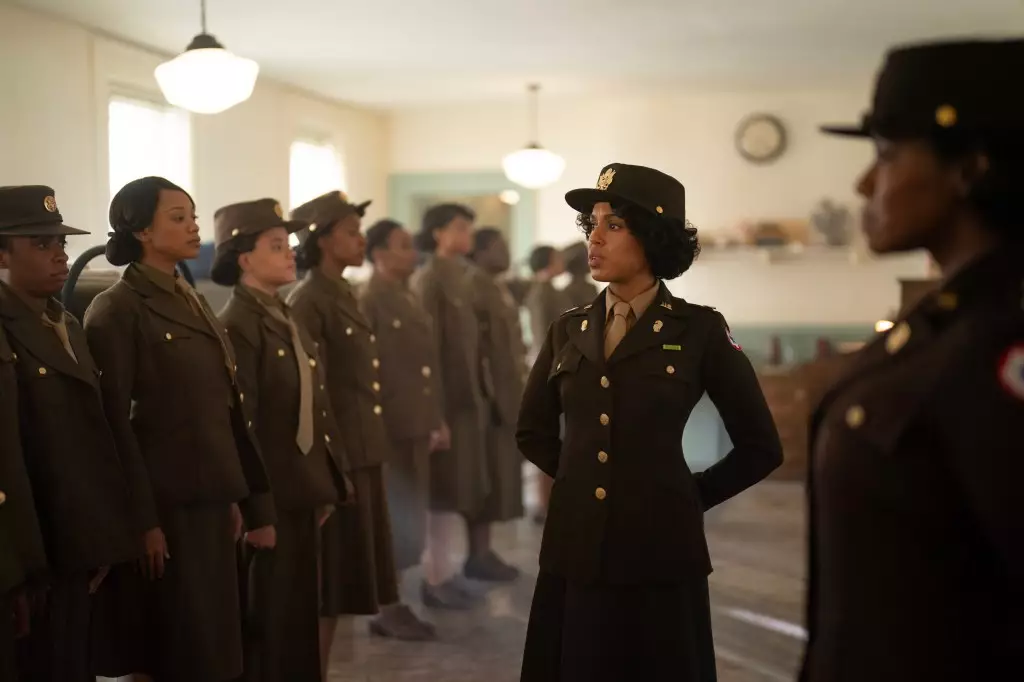As the landscape of film continues to evolve, Tyler Perry emerges as an even more versatile filmmaker with his latest work, *The Six Triple Eight*. This Netflix production sheds light on the largely overlooked contributions of the 6888th Central Postal Directory Battalion, a remarkable unit composed of African American women who served in World War II. While WWII cinema has predominantly focused on male heroes and battlefield exploits for nearly eight decades, Perry’s film not only recounts an inspiring true story but emphasizes the broader implications of women’s contributions during times of war, helping audiences understand that heroism is not limited to the front lines.
Set against the tumultuous backdrop of WWII, this film features over 855 women of color, predominantly Black women, who faced not only the perils of war but systemic racism and sexism. They were specifically tasked with ensuring that mail — the lifeline for soldiers and their families — reached its destination. In a time when text messages and social media were nonexistent, snail mail was the only means of communication. The importance of their role is encapsulated in the statement made by Major Charity Adams: “No Mail, No Morale.” The film provides a fresh narrative that courageously dives into the untold experiences of these women, offering a critical examination of their overshadowed bravery.
Perry deftly builds on the foundation laid by the previous films like *Hidden Figures*, which highlighted the unrecognized contributions of Black women to the American space program. For *The Six Triple Eight*, Perry continues this trend of illuminating historic events that deserve recognition, thereby enhancing cultural understanding and appreciation. By focusing on Major Adams, portrayed by Kerry Washington, we are allowed a glimpse into the hardships and triumphs of women who did not receive the accolades they deserved, even as they forged paths in the male-dominated military landscape.
Opening scenes establish a poignant personal narrative with characters like Lena Denniecott King, played by Ebony Obsidian. The blossoming romance with her partner, suddenly interrupted by the war, adds emotional depth to the plot. This sets the stage to highlight the larger mission of the 6888th Battalion, forging a connection between the viewers and the women’s experiences. Such personal storytelling helps humanize history and contextualizes their struggle in the broader framework of war.
The film successfully showcases the various challenges faced by the 6888th Battalion beyond the physical labor. The women navigated not only the complexity of managing millions of pieces of mail but also the undercurrents of racism and sexism that permeated every aspect of their service. Characters like General Halt, played by Dean Norris, exemplify the daunting obstacles these women faced, as they often dealt with authority figures who lacked respect for their contributions.
Despite the pervasive struggles, Perry’s storytelling is uplifting, focusing on the unity, resilience, and commitment that the battalion displayed. The interplay between adversity and triumph showcases not just the spirit of these women but reinforces the historical necessity for acknowledgment of their sacrifices. With a dexterous script adapted from Kevin M. Hymel’s *Fighting A Two-Front War*, Perry shines a light on the human elements of military life, which have often been overlooked in historical narratives.
The film’s production design, under the leadership of Sharon Busse, artfully transports viewers back to the 1940s, while costume designer Karyn Wagner meticulously outfits the cast to reflect the era’s authenticity. This attention to detail, along with Aaron Zigman’s evocative musical score and H.E.R.’s emotionally resonant song “The Journey,” significantly enhances the storytelling impact.
Critically, Perry manages to avoid overly sentimentalizing the story of these military women, balancing genuine emotion with respectful acknowledgment of their sacrifices. The film paves the way for comprehending the value of these unsung heroes just when audiences seek meaningful narratives during the holiday season.
*The Six Triple Eight* is not merely a war film; it is a celebration of courage, strength, and the indomitable spirit of women who served during one of the most challenging periods in history. As it prepares for its release on Netflix, we can only hope that it inspires future generations to appreciate and remember the sacrifices that shaped our society — one letter at a time.


Leave a Reply